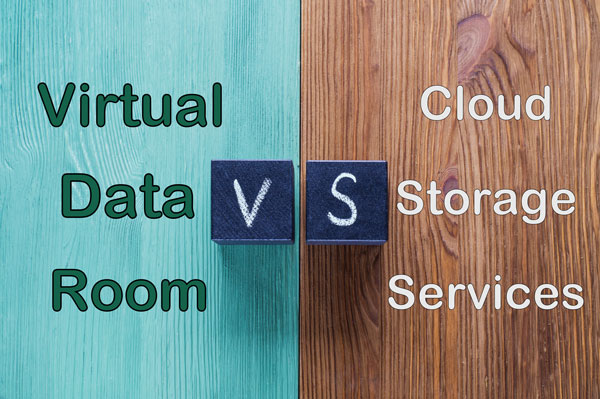The epoch when businessmen used to store all their documents, employees’ contracts, financial reports, and other vital papers in huge repositories are long gone. No, it does not mean that no paper documents exist anymore – it means that they are not the only acceptable way to preserve information. In fact, physical repositories packed with paper stacks make the data vulnerable: you never know what may happen to the repository, who may enter it and steal your files, etc. Today, the additional data protection guarantee is ensured by cloud services.
In general, there are two types of such storages – virtual data rooms and generic cloud storage services (such as DropBox, Google Drive, OneDrive, etc.). Being based on the same technology they have quite a lot in common. When you keep your files in one of the storages mentioned you, actually, keep them in a virtual cloud: digital copies of your paper documents are being uploaded to servers that are likely to be scattered geographically. Hence, in a case anything happens to your analog files you may always restore them from a cloud: a VDR and a generic cloud service prove to be perfect spaces to archive and to back up important files.
Moreover, both of them are convenient venues for collaboration with partners, investors, employees, etc. Any file or folder which you keep in the cloud can be accessed by users who are allowed to see it. Basically, you invite people to work with your data remotely. It saves you and the other participants of a project a considerable amount of time and efforts.
Thus, VDRs and regular cloud services prove to be much more efficient than physical repositories as they guarantee convenient data storage and quick sharing of information.

Unique Advantages Inherent to Virtual Platforms
Even though virtual platforms and cloud storages seem to be similar in terms of their functions and benefits, there is one crucial difference between them: cloud storages are relatively insecure and lack features required for collaboration on the level of corporations while VDRs have been designed to assist throughout complex cross-national transactions.
In a comparison to generic cloud services, virtual rooms have a lot of advantageous peculiarities:
- Virtual repositories are characterized by the bigger size of the storage: you may even purchase an unlimited storage if you are involved in a large-scale project and you need to share a large volume of data;
- Any VDR is protected on multiple levels so that none of your files leak and face the risk of being stolen. When you use a regular cloud storage you cannot expect such attention to data security;
- As the majority of projects executed via virtual platforms are international and imply costly transactions the uninterrupted customer support is required. Indeed, in a case something goes wrong you may expect an immediate and qualified assistance of a support team;
- Due to regular reports, you always know what is going on in your room as all the actions of all the visitors are being registered. A cloud storage would never provide you with such a detailed insight into the activity of your partners;
- You may manage the accessibility of all the files and folders, prevent certain users from browsing selected documents, etc. Within a VDR it is easy to manage the rights of a big flow of users and to control the disclosure of information.
Evidently, virtual rooms prove to be more convenient for corporate users, businessmen, governments, etc. If you need a secure and highly functional virtual environment to collaborate with numerous stakeholders, a VDR should be your choice. But if you are looking for a platform that is more convenient and efficient for individual exploitation, space where you may store your photos or backup some important documents then generic cloud storage would satisfy your needs perfectly.
ليست هناك تعليقات:
إرسال تعليق